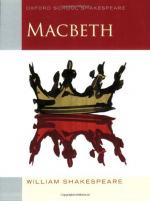|
This section contains 10,096 words (approx. 34 pages at 300 words per page) |

|
SOURCE: Zamir, Tzachi. “Upon One Bank and Shoal of Time: Literature, Nihilism, and Moral Philosophy.” New Literary History 31, no. 3 (summer 2000): 529-51.
In the following essay, Zamir considers the thematic contrast between Macbeth's nihilistic preoccupation with the absence of value and temporality and Macduff's emotional and highly temporal existentialism. For the critic, Macbeth serves as an example of the significant role that literary texts can play in the didactic representation of fundamental philosophical concerns.
They thought him honest and they “loved him well,” a valiant, worthy gentleman. A brave man, the bridegroom of Bellona, the Roman war goddess. He won “golden opinion from all sorts of people.” But all that changed. Instead, he became despised for his treachery and feared for actions that know no moral bounds. From murdering his king to killing his past friends and from that to infanticide, Macbeth's story, at least from the perspective of...
|
This section contains 10,096 words (approx. 34 pages at 300 words per page) |

|


